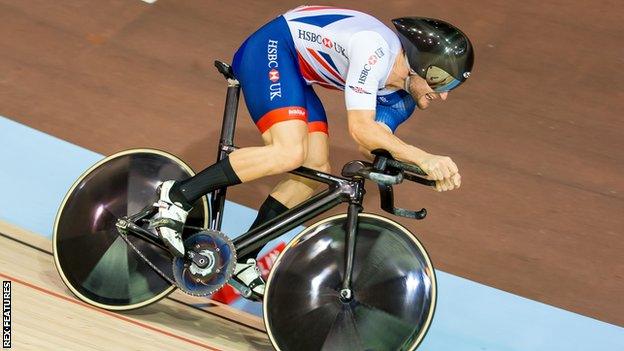Global Athlete: new body launched 'to give athletes a voice'
- Published

Callum Skinner won the silver medal in the individual sprint at the 2016 Summer Olympics
British cyclist Callum Skinner is to help lead a new organisation that aims to "give a voice" to Olympic and Paralympic athletes across the world.
Global Athlete says it will be "an athlete-led movement for change", listening to and empowering sportsmen and sportswomen.
It comes in the wake of the Russian doping crisis and the US gymnastics sex abuse scandal.
Both issues led to unprecedented calls for enhanced rights for athletes.
'Lead athlete' Olympic champion Skinner has been tasked with signing up fellow competitors.
"We will inspire and change sport for the better and bring it into the 21st century," he said.
In a sign of the ambitions of the new initiative, former World Anti-Doping Agency (Wada) deputy director general Rob Koehler has been appointed director general of Global Athlete.
He told BBC Sport he would lead a "listening exercise" with athletes across the world in the coming months, to understand what changes they want to see in sport.
"The time has come for a more representative and impactful voice for athletes," he said.
"The status quo isn't working. It's time to give a more representative voice and meaningful role to athletes."
Many athletes in the west felt their opinion was ignored in the aftermath of the Russian doping scandal, with suspensions of the country recently lifted by both Wada and the International Paralympic Committee, despite opposition.
Wada officials 'disrespected' me - Scott tells BBC sports editor Dan Roan
"Athletes' voices should not be suppressed or manipulated to further personal aims - it's time for the athlete voice to be embraced and empowered," said Skinner.
"We want what is best for the athletes and athletes want what is best for the sport."
Global Athlete, which is being funded by FairSport, external - a not-for-profit independent organisation dedicated to eradicating cheating - claims it wants to achieve a "sea change" in terms of how sport is run: "Whether that be in areas of better athlete welfare, tackling harassment, ensuring that athletes receive some Olympic revenues or prize money, a more robust anti-doping system or better representation."
The organisation says it will have a constructive relationship with existing athlete unions, and be more independent than the existing system of athlete committees, that are funded by or attached to the IOC, national Olympic associations, anti-doping bodies or governments.
British para-powerlifter Ali Jawad, who has previously called for athletes to enjoy a greater say in decision-making at Wada, has also joined the fledgling organisation.
"We believe all athletes have an equal voice regardless of whether or not you have been elected to athlete commission already. What Global Athlete is aiming to do is to give much greater numbers of athletes an empowered voice to make sport a better place."
The launch comes amid a growing number of examples of athlete activism.
Last year the chair of Wada's athlete committee Beckie Scott told the BBC she felt "bullied" by senior members of the organisation over her opposition to the reinstatement of Russia, sparking an investigation.
Meanwhile British swimmer Adam Peaty is among a host of leading swimmers to have criticised the leadership of world governing body Fina over the past year.
Last month former GB cyclist Jess Varnish lost a lawsuit against UK Sport and British Cycling at an employment tribunal, but said she was "happy I was the catalyst for other athletes to speak up and challenge their coaches and organisations, to push for a better and fairer environment in which to excel".
Wada's reformist vice-president Linda Helleland has vowed to prioritise athletes if elected president of the organisation later this year.
However, the Norwegian former minister recently lost a key vote of European governments to Polish rival Witold Banka.
The move to set up an independent organisation has, though, drawn criticism.
The IOC Athletes' Commission - which serves as a link between the athletes and the IOC - said there remained "many unanswered questions about universality, accountability and funding".
It added: "It's disappointing that this group seems to believe that none of us care about athletes and none of us do a good job for athletes if we are part of the Olympic movement."